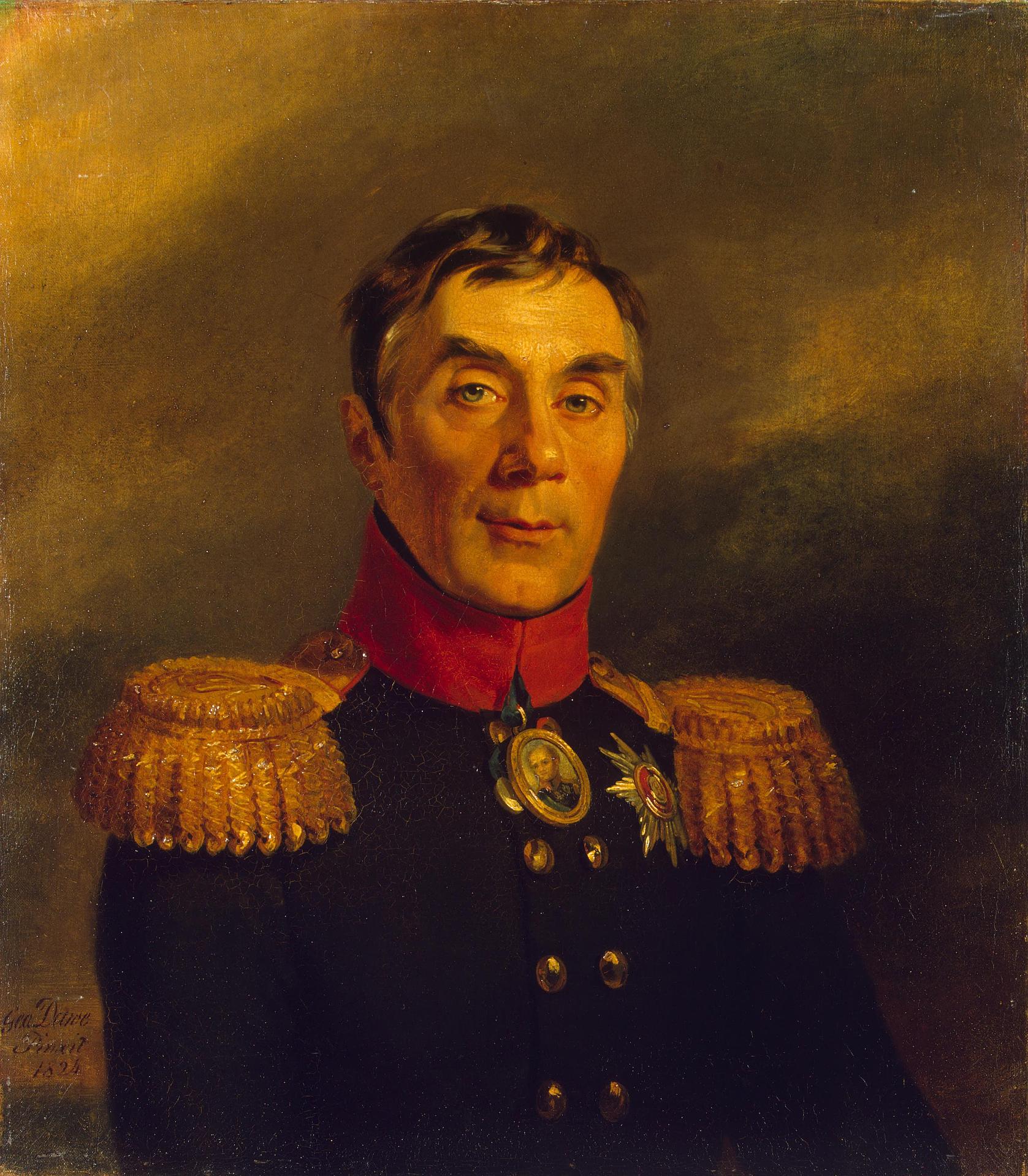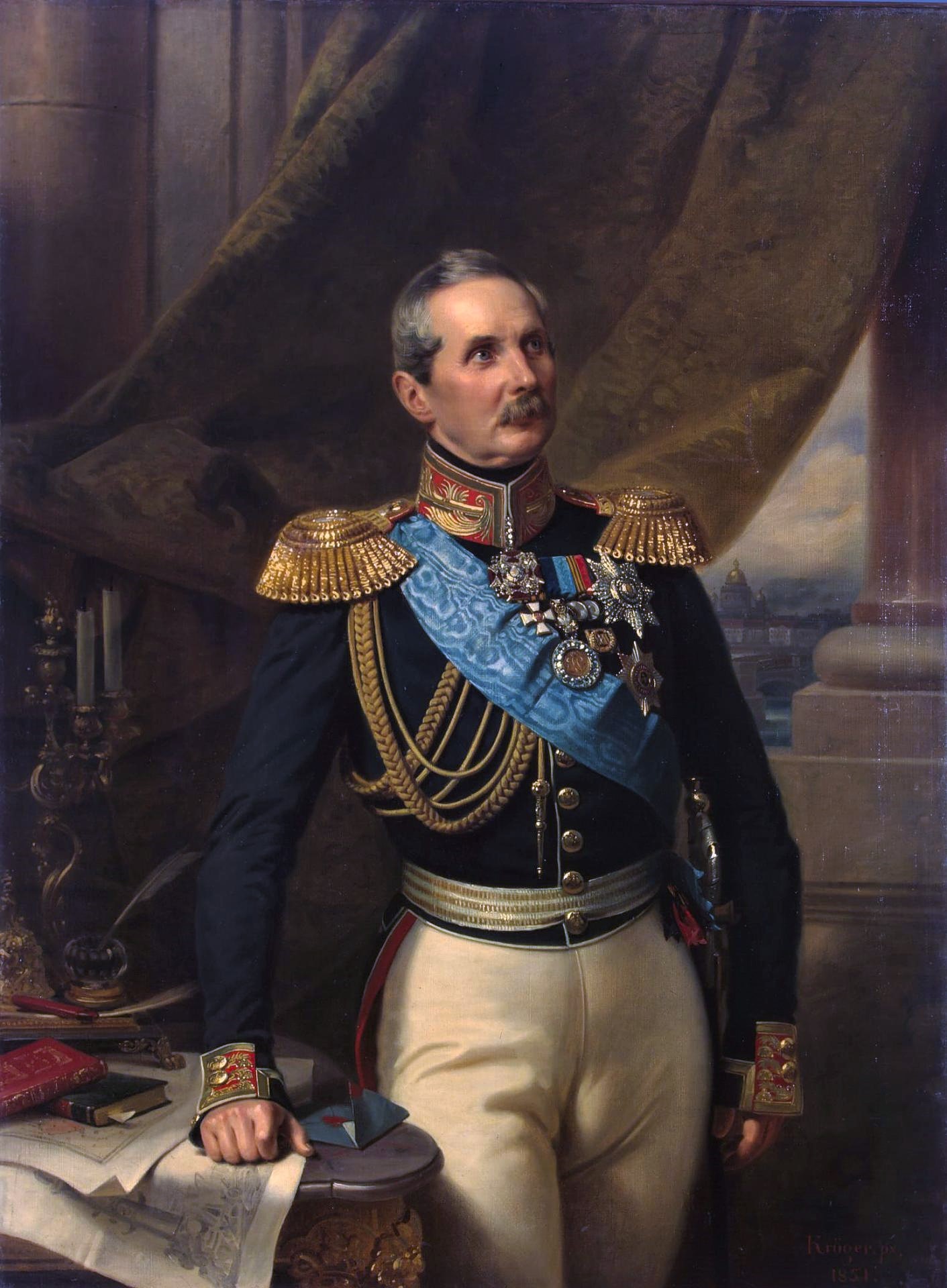|
Ivan Sherwood Verny
Ivan Vasiyevich Sherwood-Verny (russian: Иван Васильевич Шервуд-Верный) (born John Sherwood; 12 March 1798 – 4 (16) November 1867) was a Russian Imperial Army officer of English descent. He was known for denouncing the Dekabrist revolt and for this act was awarded the surname Shervud Verny or Sherwood the Faithful by Tsar Nicholas I. Early life John Sherwood was born in Hull, Yorkshire, England and emigrated to Russia with his parents, engineer William Sherwood and Martha née Feltham in 1800 when his father worked at the Imperial Alexandrov factory in St Petersburg. [Note: He is often wrongly said to have been born in Greenwich or Gravesend - a confusion arising from the fact that the family resided at Greenwich prior to their departure for Russia and took ship at Gravesend). The Sherwood family were a well established Yorkshire family of farmers Cotton Mill engineers, drapers and clockmakers. The family remained in touch despite the distance of s ... [...More Info...] [...Related Items...] OR: [Wikipedia] [Google] [Baidu] |
Dekabrist
The Decembrist Revolt ( ru , Восстание декабристов, translit = Vosstaniye dekabristov , translation = Uprising of the Decembrists) took place in Russia on , during the interregnum following the sudden death of Emperor Alexander I. Alexander's heir apparent, Konstantin, had privately declined the succession, unknown to the court, and his younger brother Nicholas decided to take power as Emperor Nicholas I, pending formal confirmation. While some of the army had sworn loyalty to Nicholas, a force of about 3,000 troops tried to mount a military coup in favour of Konstantin. The rebels, although weakened by dissension between their leaders, confronted the loyalists outside the Senate building in the presence of a large crowd. In the confusion, the Emperor's envoy, Mikhail Miloradovich, was assassinated. Eventually, the loyalists opened fire with heavy artillery, which scattered the rebels. Many were sentenced to hanging, prison, or exile to Siberia. The ... [...More Info...] [...Related Items...] OR: [Wikipedia] [Google] [Baidu] |
Tsar Nicholas I
, house = Romanov-Holstein-Gottorp , father = Paul I of Russia , mother = Maria Feodorovna (Sophie Dorothea of Württemberg) , birth_date = , birth_place = Gatchina Palace, Gatchina, Russian Empire , death_date = , death_place = Winter Palace, Saint Petersburg, Russian Empire , burial_place = Peter and Paul Cathedral, St. Petersburg, Russian Empire , religion = Russian Orthodox , signature = Signatur Nikolaus I. (Russland).PNG Nicholas I , group=pron ( – ) was Emperor of Russia, King of Congress Poland and Grand Duke of Finland. He was the third son of Paul I and younger brother of his predecessor, Alexander I. Nicholas inherited his brother's throne despite the failed Decembrist revolt against him. He is mainly remembered in history as a reactionary whose controversial reign was marked by geographical expansion, economic growth, and massive industrialisation on the one hand, and centralisation of administrative policies and repress ... [...More Info...] [...Related Items...] OR: [Wikipedia] [Google] [Baidu] |
Vladimir Osipovich Sherwood
Vladimir Osipovich Sherwood (russian: Владимир Осипович Шервуд; also spelled Shervud, August 30, 1832 in Istleyevo, Tambov Governorate – July 27, 1897) was a Russian painter and architect who worked in Moscow. He was an Eclectics and Russian Revival practitioner, architect of the State Historical Museum on the Red Square in Moscow. Biography He was the son of Joseph Sherwood, an Anglo-Russian engineer whose father was William Sherwood, a Roman Catholic cotton machine engineer who had come to Russia at the invitation of Tsar Paul I on October 11, 1800.http://sherwood-family.livejournal.com Joseph died when Vladimir was five years old. His uncle John Sherwood was an influential lieutenant in Tsar Alexander I's service. In fact John Sherwood (Ivan Sherwood Verny in Russian) was responsible for reporting the Dekabrist Conspiracy in 1825, a service for which he was ennobled and given the honorific Shervud Vernyi - Sherwood the Faithful. Vladimir Osipovich bec ... [...More Info...] [...Related Items...] OR: [Wikipedia] [Google] [Baidu] |
Aleksey Arakcheyev
Count Alexey Andreyevich Arakcheyev or Arakcheev (russian: граф Алексе́й Андре́евич Аракче́ев) ( – ) was an Imperial Russian general and statesman during the reign of Tsar Alexander I. He served under Tsars Paul I and Alexander I as an army commander and Inspector of Artillery. He had a violent temper, but was a competent artillerist, and is known for his reforms of Russian artillery known as the "System of 1805". When Alexander was succeeded by Nicholas I, he lost all his offices. Early years Count Arakcheyev was born on his father's estate in Garusovo, in Vyshnevolotsky Uyezd (at the time a part of Novgorod Governorate, from 1796 part of Tver Governorate). He was educated in arithmetic by a priest, and though he shone at arithmetic, he never mastered writing and grammar. In 1783, with the help of General Peter Ivanovich Melissino, Arakcheyev enrolled in the Shlyakhetny artillery school in Saint-Petersburg. By 1787 he had become a lieutenant i ... [...More Info...] [...Related Items...] OR: [Wikipedia] [Google] [Baidu] |
Pyotr Kleinmichel
Count Pyotr Andreevich Kleinmichel (russian: Пётр Андре́евич Клейнми́хель, tr. ), also known by German name Peter von Kleinmichel (30 November 1789 – 3 February 1869), was Minister of Transport of Imperial Russia (1842–1855). He fought at the Battle of Leipzig and the Battle of Borodino. In March 1814, Alexander I was concerned for the safety of his brothers Nicholas and Constantine, who were involved in the occupation of Paris. He dispatched Kleinmichel to warn them and advise them to return to Basel. After succeeding in this, Kleinmichel was made Aide-de-Camp to the Tsar. The event also brought him to the attention of the future Tsar Nicholas I He was responsible for building the Saint Petersburg–Moscow Railway and for restoring the Winter Palace after the 1837 fire. It was rumored that Nicholas I promoted his career because Kleinmichel adopted the Emperor's illegitimate children as his own. His first wife divorced him, citing his sexua ... [...More Info...] [...Related Items...] OR: [Wikipedia] [Google] [Baidu] |
Hans Karl Von Diebitsch
Hans Karl Friedrich Anton Graf von Diebitsch und Narten (russian: Ива́н Ива́нович Ди́бич-Забалка́нский, tr. ; 13 May 1785 – 10 June 1831) was a German-born soldier serving as Russian field marshal. Career Hans Karl was educated at the Berlin cadet school, but by the desire of his father, Frederick II's aide-de-camp who had passed into the service of Russia, he also did the same in 1801. He served in the campaign of 1805, and was wounded at Austerlitz, fought at Eylau and Friedland, and after Friedland was promoted captain. Endnotes: * Belmont (Schumberg), ''Graf Diebitsch'' (Dresden, 1830); * Strmer, ''Der Tod des Grafen Diebitsch'' (Berlin, 1832); * Bantych Kamenski, ''Biographies of Russian Field-Marshals'' (St Petersburg, 1841) During the next five years of peace he devoted himself to the study of military science, engaging once more in active service in the War of 1812. He distinguished himself very greatly in Wittgenstein's ca ... [...More Info...] [...Related Items...] OR: [Wikipedia] [Google] [Baidu] |
Alexander Von Benckendorff
Konstantin Alexander Karl Wilhelm Christoph Graf von Benckendorff (russian: Александр Христофорович Бенкендорф, Alexander Khristoforovich Benkendorf, – ) was a Baltic German Cavalry General and statesman, Adjutant General of Tsar Alexander I, a commander of ''partisan'' (''Kossak irregular'') units during the War of 1812–13. However, he is most frequently remembered for his later role, under Tsar Nicholas I, as the founding head of the Gendarmes and the Secret Police in Imperial Russia. Family and career Alexander von Benckendorff was born into the Baltic German noble Benckendorff family in Reval (Tallinn in present-day Estonia), son of General Baron (12 January 1749, Friedrichsham – 10 June 1823, Kolga), who served as the military governor of Livonia, and of his wife Baroness Anna Juliane Charlotte Schilling von Canstatt (31 July 1744, Thalheim – 11 March 1797, Riga), who held a high position at the Romanov court as senior lady- ... [...More Info...] [...Related Items...] OR: [Wikipedia] [Google] [Baidu] |
Russo-Turkish War (1828–1829)
The Russo-Turkish War of 1828–1829 was sparked by the Greek War of Independence of 1821–1829. War broke out after the Ottoman Sultan Mahmud II closed the Dardanelles to Russian ships and revoked the 1826 Akkerman Convention in retaliation for Russian participation in October 1827 in the Battle of Navarino. The Balkan front At the start of hostilities the Russian army of 100,000 men was commanded by Emperor Nicholas I, while the Ottoman forces were commanded by Agha Hussein Pasha. In April and May 1828 the Russian commander-in-chief, Prince Peter Wittgenstein, moved into Romanian Principates Wallachia and Moldavia. In June 1828, the main Russian forces under the emperor crossed the Danube and advanced into Dobruja. The Russians then laid prolonged sieges to three key Ottoman citadels in modern Bulgaria: Shumen, Varna, and Silistra. With the support of the Black Sea Fleet under Aleksey Greig, Varna was captured on 29 September. The siege of Shumen proved much more probl ... [...More Info...] [...Related Items...] OR: [Wikipedia] [Google] [Baidu] |
Siege Of Varna
The siege of Varna (July–September 29, 1828) was a battle during the Russo-Turkish War, 1828–1829. History Varna was held by the Ottoman army. An approach to Varna by Russian forces was first attempted on June 28, but the Russian avantgarde was met by significant Turkish forces, and the siege was postponed. By the end of July, the Black Sea Fleet under the command of Aleksey Greig approached Varna and delivered the landing forces. In mid-August the Guards Corps arrived at Varna, with Emperor Nicholas I. Thsiegewas put under the command of Adjutant General Menshikov, with total forces of 23,000 personnel and 170 artillery pieces against the 20,000 garrison of Varna. When Menshikov was wounded the siege was entrusted to General Field Marshal Mikhail Semyonovich Vorontsov. In an attempt to relieve the siege of Varna, Omer Vrioni brought an army of 20,000 but was successfully held off. At the battle of Kurtepe the Russians under Prince Eugen of Württemberg attacked b ... [...More Info...] [...Related Items...] OR: [Wikipedia] [Google] [Baidu] |
Shlisselburg Fortress
The fortress at Shlisselburg is one of a series of fortifications built in Shlisselburg on Orekhovy Island in Lake Ladoga, near the present-day city of Saint Petersburg, Russia. The first fortress was built in 1323. It was the scene of many conflicts between Russia and Sweden and changed hands between the two empires. During World War II, it was heavily damaged. Today it is part of the UNESCO World Heritage site Historic Centre of Saint Petersburg and Related Groups of Monuments. Origins A wooden fortress named Oreshek () or Orekhov () was built by Grand Prince Yury of Moscow (in his capacity as Prince of Novgorod) on behalf of the Novgorod Republic in 1323. It guarded the northern approaches to Novgorod and access to the Baltic Sea. The fortress is situated on Orekhovets Island whose name refers to nuts in Swedish as well as in Finnish (''Pähkinäsaari'', "Nut Island") and Russian languages. After a series of conflicts, a peace treaty was signed at Oreshek on August ... [...More Info...] [...Related Items...] OR: [Wikipedia] [Google] [Baidu] |
1798 Births
Events January–June * January – Eli Whitney contracts with the U.S. federal government for 10,000 muskets, which he produces with interchangeable parts. * January 4 – Constantine Hangerli enters Bucharest, as Prince of Wallachia. * January 22 – A coup d'état is staged in the Netherlands ( Batavian Republic). Unitarian Democrat Pieter Vreede ends the power of the parliament (with a conservative-moderate majority). * February 10 – The Pope is taken captive, and the Papacy is removed from power, by French General Louis-Alexandre Berthier. * February 15 – U.S. Representative Roger Griswold (Fed-CT) beats Congressman Matthew Lyon (Dem-Rep-VT) with a cane after the House declines to censure Lyon earlier spitting in Griswold's face; the House declines to discipline either man.''Harper's Encyclopaedia of United States History from 458 A. D. to 1909'', ed. by Benson John Lossing and, Woodrow Wilson (Harper & Brothers, 1910) p171 * March &ndas ... [...More Info...] [...Related Items...] OR: [Wikipedia] [Google] [Baidu] |







